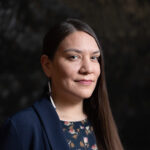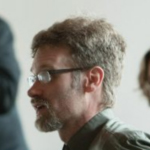The Water Policy Scholars program brings policy researchers across the Universities of Wisconsin together with freshwater scientists to frame policy questions and adapt tools to address water resource issues. The program is intended to increase the Center for Water Policy’s capacity to develop interdisciplinary and sustainable solutions to freshwater problems.
We open an annual Request for Proposals from faculty in mid January and determine awards in April.
On This Page
Current Scholars
James Wasley

2024-25 Water Policy Scholar
Professor, Architecture; Affiliate Professor, Freshwater Sciences
University of Wisconsin-Milwaukee
As a Water Policy Scholar, Professor Wasley’s research project Possible Future Uses of the Port of Milwaukee’s Dredged Material Disposal Facilities – a Test Case for the Great Lakes Green/ Blue Infrastructure Design Research + Practice Network will explore the question: “What possible ecologically progressive futures can we imagine for Milwaukee’s Dredged Material Disposal Facilities (DMDFs) at Jones Island?” These two facilities, one nearing capacity and one newly created, are representative of the network of dredge-spoil facilities associated with Great Lakes ports. The collective scale and pivotal locations of these created lands places their future squarely within one of ten Grand Water Challenges identified by the Freshwater Collaborative of Wisconsin: Great Lakes Management and Restoration. This question also serves as a test case for a second question that Professor Wasley has been engaged with since his 2017-18 Water Policy Fellowship: “Is it possible to create a viable network of academic researchers, design related professionals, government officials and other interested parties to promote innovation in nature-based design solutions addressing problems of Great Lakes Cities?”
Building on the 2019 National Sciences Foundation Sustainable Urban Systems Workshop “Reimagining Water: Linking Sustainable Urban Water Systems in the Great Lakes Basin,” held at UWM, and the 2022 Great Lakes Higher Education Consortium Workshop “Reimagining Water II: The Future of Blue-Green Infrastructure in the Great Lakes Basin” held at the University of Toronto, the work of this fellowship will be to convene a meeting of experts on issues associated with the DMDFs and representing the steering committee of the nascent Great Lakes Green/ Blue Infrastructure Design Research + Practice Network. The immediate deliverable will be a paper placing the Milwaukee DMDF in a basin-wide context, inventorying existing examples of closure and conversion, and speculating on additional possibilities. The larger goal is to identify possible funding sources for “Reimagining Water III.”
James Wasley is a Professor in the UWM Architecture Department and is a Director of the Institute for Ecological Design. He is also an Affiliate Professor at the UWM School of Freshwater Sciences. His research focuses on designing and implementing ecological urban waterscapes. Grounded in the Great Lakes, this research has recently expanded to include a comparative focus on the restoration of the Emscher River in the Ruhr region of Germany and on green/blue infrastructure in German urban design.
Past Scholars
Grace Bulltail

2023-24 Water Policy Scholar
Assistant Professor, Nelson Institute for Environmental Studies
University of Wisconsin-Madison
Water resources management on Indigenous lands within the boundaries of the U.S. is a complex issue that is hampered by the lack of high-quality and easily accessible databases. The management intricacy of on-reservation water resources arises due to the involvement of three distinct governments, each with its own regulatory and water allocation systems: tribal, federal, and state. In addition to practical challenges, this complex management system presents significant technical and methodological challenges, including the need for transparent and accessible databases to ensure sustainable water resources. The lack of useful tribal database, consequently, has limited opportunities to research water resources management, produce scientific findings, and eventually attain environmental justice for tribal communities.
Dr. Grace Bulltail’s research assessed FAIR data principles in water-related databases on Indigenous lands in Wisconsin. FAIR principles include the Findability, Accessibility, Interoperability, and Reusability of a database, leading to efficient data management. The focus of this project was on assessing the discoverability and reusability of these databases in terms of both water quality and quantity variables. The research: 1) Explored, listed, and reviewed the available water-related databases on reservation lands in Wisconsin; 2) Developed an evaluation methodology to assess the adherence of the released databases to the FAIR data principles; and 3) Identified the strengths and weaknesses of these databases to develop a comprehensive access protocol that improves their discoverability and usability.
Dr. Bulltail is originally from Montana; she is a member of the Crow Tribe and a descendant of the Mandan, Hidatsa, and Arikara Tribes. Dr. Bulltail is an assistant professor in the Nelson Institute for Environmental Studies at the University of Wisconsin-Madison. She completed a doctoral degree in biological & environmental engineering at Cornell University. Dr. Bulltail’s research lab focuses on natural and water resource management, land use, and resource sovereignty in Indigenous communities. Dr. Bulltail is a member of American Indian Science & Engineering Society board of directors and is a professional engineer licensed in the state of California. She serves on the U.S. Departments of Interior and Justice Not Invisible Act Commission charged with addressing the crisis of missing and murdered Indigenous people.
Laura Suppes

2022-23 Water Policy Scholar
Associate Professor, Public Health and Environmental Studies
University of Wisconsin-Eau Claire
Steering Committee
Freshwater Collaborative Water Policy Network
Per- and polyfluoroalkyl substances (PFAS) are persistent, harmful, emerging contaminants present in Wisconsin ground water used for human consumption. When ingested, PFAS are associated with adverse health effects. Dr. Suppes’ Water Policy Scholar project, Model development for Assessing Illness Risk from PFAS Ingestion Exposures in Wisconsin, can help inform policy making around this emerging contaminant in water quality safety and public health. Water quality safety and emerging contaminants is one of the Freshwater Collaborative of Wisconsin’s ten grand challenges.
Dr. Suppes’ research aimed to assess the risk of adverse health outcomes from PFAS exposure in Eau Claire, WI residents. Eau Claire has over 68,000 residents who rely on ground water as the source of municipal drinking water. PFAS were discovered in four of Eau Claire’s 16 municipal water wells during summer of 2021. Although Eau Claire’s water utility has stopped using the contaminated wells, residents consuming municipal drinking water prior to 2021 were exposed to PFAS.
Exposure data unique to the Eau Claire community, like average water ingestion volumes, was collected and analyzed. Results were shared with the Eau Claire City-County Health department for use in public health messaging about PFAS exposure and illness risk, if any. Dr. Suppes developed a PFAS Drinking Water Exposure Risk Assessment Excel Tool for other communities to use. In the model, exposure inputs can be customized to assess illness probabilities in other areas of Wisconsin where PFAS have emerged as a drinking water contaminant. Community leaders, researchers or decision makers can use the model to assess illness probabilities unique to Wisconsin communities, helping guide policy decisions.
Laura M. Suppes, PhD, MPH, REHS, is an Associate Professor in Public Health and Environmental Studies at the University of Wisconsin – Eau Claire. She received her MPH in Public Health Administration and Policy from the University of Minnesota and PhD in Environmental Health Sciences from the University of Arizona. Her research interests are chemical and biological hazard identification and remediation in water, exposure assessment, and quantitative microbiological risk assessment. Her most recent research focuses on surveying indicators of nitrate contamination in private well water and assessing the impact of cyanuric acid on risk of gastrointestinal illness among swimmers.
To watch Dr. Suppes discussion of her research process, results, and the risk assessment model she has shared, view our 2023 Earth Month Webinar – Assessing Illness Risk from PFAS Drinking Water Exposures in Wisconsin.
To understand the regulatory context for this research, read our April 2023 PFAS Contamination in Wisconsin’s Public Drinking Water Supplies Policy Brief.
Timothy Ehlinger

2021-22 Water Policy Scholar
Associate Professor and William Collins Kohler Chair in Systems Change and Peacebuilding
UWM School of Nursing
With competing demands on water resources interacting with climate stress and political polarization, the need for developing agile governance frameworks that can identify feedbacks and engage communities in ecosystem stewardship is great. Dr. Ehlinger’s Water Policy Scholar project examined the efficacy of participatory systems mapping with stakeholders as a tool for transforming conflict and building deliberative legitimacy. The work was conducted in partnership with the Lake Beulah Protection and Improvement Association and Lake Beulah Management District and expanded participation in local decision-making and worked to build trust between conflicting parties while maintaining legitimacy with local and state authorities such as the Wisconsin Department of Natural Resources.
Margaret Noodin

2019-20 Water Policy Scholar
Professor
UWM English & American Indian Studies
Watch our World Water Day 2021 Celebration event featuring Dr. Noodin’s work as a Water Policy Scholar, March 17, 2021.
As the 2019-2020 Water Policy Scholar, Professor Noodin led the Mapping Indigenous Connections project, which provides a visual guide to the many Native American nations that are part of the Anishinaabe Confederacy. The Mapping project focuses on more than 140 Ojibwe, Odawa and Potawatomi nations. Linked by the Anishinaabemowin language, these communities are located around the western Great Lakes. Noodin is interested in finding an approach that integrates the Nations’ valuable perspective around ecosystem resilience in the Basin in the face of economic and climates shifts. Her work helps raise not only a deeper understanding of the Nations, but also could inform important policy issues.
Ryan Holifield

2018-19 Water Policy Scholar
Associate Professor
UWM Geography
Ryan Holifield is an associate professor in the UWM Department of Geography and Urban Studies Programs. His research focuses on issues of environmental justice and democratic participation in environmental policy and governance, especially in urban contexts. One current collaborative project investigates geographic dimensions of stakeholder participation in remedial action plans at Great Lakes Areas of Concern: toxic hotspots of contamination and environmental degradation. The objectives of his participation in the Water Policy Scholars program was to complete the collaborative project on participation in Great Lakes Areas of Concern and to develop new potential collaborations that could build on this research, take it into new directions, and expand its scope.
James Wasley

2017-18 Water Policy Scholar
Professor
UWM Architecture
James Wasley is a Professor in the UWM Architecture Department and is the current Director of the Institute for Ecological Design. His research focuses on designing and implementing ecological urban waterscapes.
As a Policy Scholar, Wasley facilitated a design workshop entitled Innovative Practice/Innovative Policy: Setting an Agenda for Advancing Integrative Green Infrastructure in the Great Lakes Basin that drew several nationally-renowned design professionals to Milwaukee in April 2017. Wasley also used his time as a Policy Scholar to develop funding proposals for green infrastructure projects with several Freshwater Sciences collaborators.
Paul Roebber

2016-17 Water Policy Scholar
Distinguished Professor
UWM Mathematics
Paul Roebber is a Distinguished Professor of Atmospheric Sciences in the UWM Mathematics Department and director of the non-profit Innovative Weather program. He is currently doing research on flash flooding, Great Lakes temperatures and water levels, and application of adaptive learning techniques to forecasting thunderstorms.
Through the Policy Scholars program, Dr. Roebber developed a statistical model that provides insight into the variability of water levels in Lakes Michigan and Superior in the coming decades. This information can help decision makers develop climate-resilient policy regarding coastal development and erosion, energy production, water treatment, and many other social and economic factors linked to fluctuating lake levels.
Scott Graham

2016-17 Water Policy Scholar
Associate Professor, English
University of Texas at Austin
Scott Graham is an associate professor at the University of Texas at Austin. He researches how scientific experts and public stakeholders communicate about matters of risk and uncertainty as part of science-policy deliberation. His current projects involve investigating the influence of public advocacy groups on regulatory decision-making and analyzing the FDA’s environmental review of the most popular pharmaceuticals products.
As a Policy Scholar, Dr. Graham focused on building the Public Engagement and Science Communication (PESC) lab, which sought to provide an interdisciplinary approach to science communication research, communications education, and stakeholder outreach, with particular attention to water science and policy.